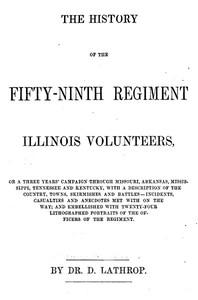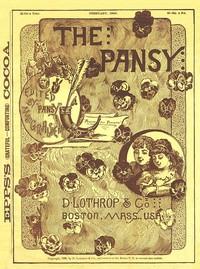|
|
Read this ebook for free! No credit card needed, absolutely nothing to pay.Words: 38211 in 9 pages
This is an ebook sharing website. You can read the uploaded ebooks for free here. No credit cards needed, nothing to pay. If you want to own a digital copy of the ebook, or want to read offline with your favorite ebook-reader, then you can choose to buy and download the ebook.

: The History of the Fifty-ninth Regiment Illinois Volunteers by Lathrop David - United States History Civil War 1861-1865 Regimental histories Illinois; United States. Army. Illinois Infantry Regiment 59th (1862-1865); Missouri Infantry. 9th Regiment 1861-1@FreeBooksWed 07 Jun, 2023 The Division broke up camp again on the 20th, and moved out in the rain and over the muddiest roads imaginable. They marched this day twenty miles, without anything to eat from the time of starting, until going into camp, and many of the boys had no supper the night before. At West Plains, some fifty of the Fifty-Ninth, were detached to report under Captain Elliott, to the gun-boat fleet, then laying at Cairo, for duty. They left the regiment about, the 25th of April, from which time, they spent the remainder of their term of service on the water. From West Plains, the regiment proceeded to Sulphur Rock, arriving there on the 8th of May. On the 10th of May, the Fifty-Ninth Illinois, Twenty-Second Indiana, and the Twenty-Fifth and Thirty-Fifth Illinois regiments, being detached from General Curtis's command, started "en route" for Cape Girardeau, Missouri. After marching nine days out of ten, these regiments arrived at the Cape on the evening of the 20th of May; having marched two hundred and fifty miles in ten days, resting one. On the morning of the 20th, the Fifty-Ninth started in the rear of the column. They were some thirty-five miles from the Cape, and all very anxious to arrive at their destination. The Twenty-Second Indiana was next ahead of the Fifty-Ninth, and equally as eager to make the Cape that day. It was a hard march, and about sundown all the regiments had bivouacked, except the Twenty-Second and Fifty-Ninth. These pulled ahead and passed the others some mile or two, when the Twenty-Second caved in. The Fifty-Ninth pushed on and came out nearest the Cape, and went into camp, exultant over their grey-hound perseverance. These regiments, on their arrival at Cape Girardeau, presented a "war worn" and rugged appearance. Some were entirely destitute of shoes, some had no coats, some were without hats, and many possessed only the remnants of pantaloons. Teams were immediately sent off to town for clothing and rations, and by the next evening, the men scarcely knew themselves in their new uniform. The 23d was a bright fair day, and Colonel Frederick priding himself exceedingly on the fine appearance of his regiment, determined to exhibit them to the admiring gaze of the citizens of the Cape. At nine o'clock, they left camp and marched to town, arriving in town the band struck up a lively march, and the steady tramp of the boys, to the time of the music, attracted the attention of the multitude. After marching through several streets, the regiment stacked arms and proceeded by companies, to the Paymaster's office, to receive their pay. After getting paid, the regiment fell into line and marched to the landing, where a steamboat was in waiting, to take them on board. This was the first indications of a ride, since leaving the old War Eagle, at Boonville. Since then, the regiment had marched twelve hundred miles, and now to be transported was quite a treat. At five o'clock, on the 23d, the boat left the camp for Hamburg landing. When opposite Paducah, Governor Yates, of Illinois, from the guards of another boat, addressed a few congratulatory and cheering remarks to the Fifty-Ninth, "upon what had transpired while they were out in the wilderness." Arriving at Hamburg landing on the 25th, the regiment went into camp some two miles from the river, out towards Corinth. Hamburg is the landing for all of General Halleck's army supplies, at this time, and the scene about the landing, is a lively one. Boats are coming up and unloading their cargoes daily. Mules, horses, wagons, rations, &c., are everywhere lumbering up the bluffs. From the boats the supplies are loaded into wagons, and forwarded to the army now before Corinth. Here are still seen many of the effects of the late battle. Here are the bluffs from which it is said many of our brave boys threw themselves into the river, to escape from the pursuing enemy." "Brave boys were they." Here the regiment was furnished with a new outfit of camp equipage, wagons and horses. Corinth was now supposed to be their destination, and in confirmation, the march towards that place was commenced on the morning of the 27th. The country from Hamburg landing to Corinth, is an unbroken wild, level and swampy. After a march of sixteen miles, over a recently constructed military road, the regiment went into camp about three miles to the north of Corinth. On the morning of the 28th, the regiment moved into position before the works of the enemy, leaving the tents standing, and the camp equipage all in camp. Some skirmishing was occurring occasionally, between our pickets and those of the enemy, but no fighting of any consequence. The vast army, that General Halleck had been for months collecting, from all parts of the country at an enormous expense, and the great amount of labor and suffering of this vast army had all been in vain--entirely useless. Corinth and the whole territory left in our possession, was entirely worthless. And all this because Beauregard would not remain in Corinth until Halleck could dig his way under his fortifications and blow him up. As soon as the rebels, with all their material, were out of danger from our troops, a forward movement was ordered. Great and universal disappointment was manifested by the whole army when the fact was known that the rebels were all gone. Many and bitter were the curses against General Halleck. Every man felt that it was by his incapacity, want of energy, or a good feeling towards the rebel army, that they escaped so easily. All confidence was lost in the capacity of General Halleck as a commander, and it has never been restored by any of his subsequent official acts. There has been two great errors committed by some body during this war. The one was the removal of Fremont from the command at Springfield, Mo., and the other is the placing Halleck in command of the army before Corinth. The fortifications about Corinth were found to be trivial, in comparison to what was expected. One line of breast works of weak construction, and nothing but a few slight embrasures comprised the whole thing. Such fortifications one year afterwards, would have been looked upon as no impediment to the advance of our army. Free books android app tbrJar TBR JAR Read Free books online gutenberg More posts by @FreeBooks
: The Old Market-Cart by Griswold F Burge Frances Burge Pierce William J Illustrator - Conduct of life Juvenile fiction; Children Conduct of life Juvenile fiction; Boys Juvenile fiction; Flowers Juvenile fiction; Siblings Juvenile fiction; Country life Juven@FreeBooksWed 07 Jun, 2023

: Aunt Affable's Story of Old Mother Bantry and Her Cat by Anonymous - Nursery rhymes; Cats Juvenile poetry@FreeBooksWed 07 Jun, 2023
|
Terms of Use Stock Market News! © gutenberg.org.in2025 All Rights reserved.






